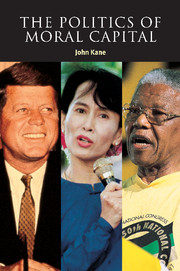Epilogue
Published online by Cambridge University Press: 22 September 2009
Summary
This book has been about those continuous judgments that people make which give rise in the political realm to what I have called moral capital – the credit accorded to individuals or institutions that helps support them in their political existence and enables them to perform intended functions and purposes. My underlying assumption has been the ubiquity and effect of moral judgment in politics, as in all of life.
As social creatures dependent upon each other for everything, from the most basic requirements of survival to the higher requirements of a life worth living, we have a necessary and perennial interest in mutually judging one another. We judge constantly, instinctively and variously according to whatever aspect of others we are, in the moment, concerned to assess; we judge lazily and habitually or acutely and urgently depending on circumstances or on individual predilection. At the lowest level, the boundless realm of gossip betrays our abiding interest in even the minutiae of the conduct and character of others. At higher levels, where interest is more materially engaged, the assessments we make are infinitely and variously consequential. We appraise the intentions, sincerity, trustworthiness, capabilities and deeds of those whose actions may impinge directly or indirectly on us or on our own, or which may have a bearing on purposes we desire to see advanced.
- Type
- Chapter
- Information
- The Politics of Moral Capital , pp. 255 - 260Publisher: Cambridge University PressPrint publication year: 2001

